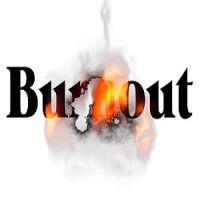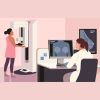A survey in the U.S. of allied health science educators that included radiologic science programme directors, found that most feel connected to the workplace 24 hours a day through smart device use. A significant number said that their only break from work communications is between midnight and 6am.
Being excessively connected to the workplace via use of smart devices, potential for emotional exhaustion and the need to set healthy boundaries are among the findings of the study, published in the November/December issue of Radiologic Technology.
Over 975 educators in radiologic science, respiratory care, athletic training and nursing were surveyed in 2014 by an interdisciplinary research team from Midwestern State University in Texas to investigate their level of stress and burnout as a result of excessive connectivity to the workplace via smart devices. Each respondent also completed an accompanying health assessment.
According to survey results, 60.7% of respondents said they feel connected to their workplace 24 hours a day, seven days a week, with 18.8% reporting that they never ignore work-related communications they receive on their smart devices during non-working hours.
James Johnston, a coauthor of the study and dean and professor of Midwestern State University’s College of Health Sciences & Human Services said the researchers were surprised that their peers reported using their smart devices on a daily basis for all purposes, with the only real pause between midnight to 6 a.m.
Although most educators were tied to their smart devices for three-quarters of the day, fifty-five percent responded that they at least sometimes ignore work-related items after hours.
The researchers cross-referenced the health assessment data with the national averages of the Maslach Burnout Inventory (MBI), which has three categories of burnout: emotional exhaustion, depersonalisation and lack of personal accomplishment. In the emotional exhaustion category, the higher the score, the higher the level of burnout. Emotional exhaustion is defined as a feeling of being emotionally overextended and exhausted by one’s work. The health science educators scored emotional exhaustion at 30.3 as against the national average of 21.25.
In the personal accomplishment category, lower scores show a higher degree of burnout. Here health science educators appear to have a higher feeling of competence and successful achievement in their work as they scored 45.1 as against the national average of 33.54.
The research team discovered that emotional exhaustion occurs when healthy boundaries are not set for smart device use for work purposes after hours. Johnston said that the researchers recommend setting firm boundaries for use.
Source: American Society of Radiologic Technologists
Image source: Pixabay
Being excessively connected to the workplace via use of smart devices, potential for emotional exhaustion and the need to set healthy boundaries are among the findings of the study, published in the November/December issue of Radiologic Technology.
Over 975 educators in radiologic science, respiratory care, athletic training and nursing were surveyed in 2014 by an interdisciplinary research team from Midwestern State University in Texas to investigate their level of stress and burnout as a result of excessive connectivity to the workplace via smart devices. Each respondent also completed an accompanying health assessment.
According to survey results, 60.7% of respondents said they feel connected to their workplace 24 hours a day, seven days a week, with 18.8% reporting that they never ignore work-related communications they receive on their smart devices during non-working hours.
James Johnston, a coauthor of the study and dean and professor of Midwestern State University’s College of Health Sciences & Human Services said the researchers were surprised that their peers reported using their smart devices on a daily basis for all purposes, with the only real pause between midnight to 6 a.m.
Although most educators were tied to their smart devices for three-quarters of the day, fifty-five percent responded that they at least sometimes ignore work-related items after hours.
The researchers cross-referenced the health assessment data with the national averages of the Maslach Burnout Inventory (MBI), which has three categories of burnout: emotional exhaustion, depersonalisation and lack of personal accomplishment. In the emotional exhaustion category, the higher the score, the higher the level of burnout. Emotional exhaustion is defined as a feeling of being emotionally overextended and exhausted by one’s work. The health science educators scored emotional exhaustion at 30.3 as against the national average of 21.25.
In the personal accomplishment category, lower scores show a higher degree of burnout. Here health science educators appear to have a higher feeling of competence and successful achievement in their work as they scored 45.1 as against the national average of 33.54.
The research team discovered that emotional exhaustion occurs when healthy boundaries are not set for smart device use for work purposes after hours. Johnston said that the researchers recommend setting firm boundaries for use.
Source: American Society of Radiologic Technologists
Image source: Pixabay
References:
Killion JB, Johnston JN, Gresham J et al. (2014) Smart device use and burnout among health science educators. Radiologic Technology, 86(2): 144-54.
Latest Articles
Tablets, smartphones, burnout
A survey in the U.S. of allied health science educators that included radiologic science programme directors, found that most feel connected to the workpla...



























